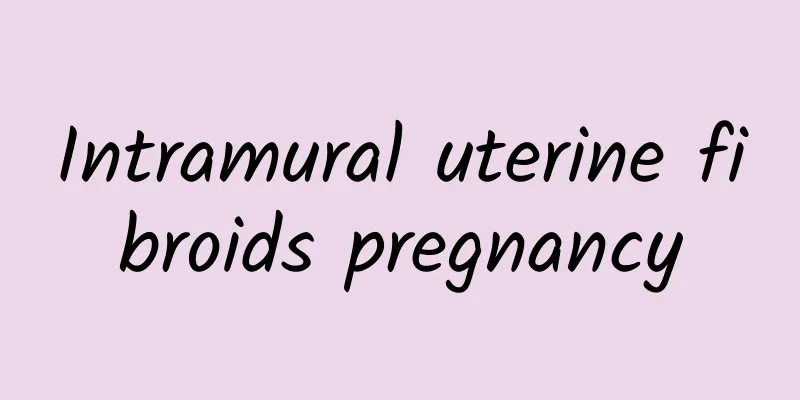Intramural uterine fibroids pregnancy

|
Intramural uterine fibroids are a relatively special tumor. Mainly because the onset of this disease is near the uterus, so for women, intramural uterine fibroids are very harmful. Intramural uterine fibroids can cause obstruction of female uterine function, especially for pregnant women, which can be very dangerous during pregnancy and delivery. So, what should you do if you get pregnant with intramural uterine fibroids? 1. What to do if you are pregnant with intramural uterine fibroids Pregnancy complicated by uterine fibroids can usually result in natural delivery, but postpartum hemorrhage should be prevented. If the fibroids hinder the descent of the fetus and a hard cesarean section is required, whether the fibroids should be removed during the operation depends on the size and location of the fibroids and the patient's condition. 2. Can I still get pregnant if I have intramural uterine fibroids? Get treatment first and then get pregnant. Uterine fibroids can reduce a woman's chances of conceiving, but patients with uterine fibroids can still become pregnant. Uterine fibroids complicated by pregnancy account for 0.5%-1% of fibroid patients. The impact of uterine fibroids on pregnancy and delivery is related to the type and size of the fibroids. 3. The harm of intramural uterine fibroids to pregnant women 1. Miscarriage. Submucosal fibroids can affect the implantation of the fertilized egg and lead to early miscarriage; excessively large intramural fibroids can cause deformation of the uterine cavity or insufficient blood supply to the endometrium, leading to miscarriage. 2. Abnormal fetal position. Fibroids that grow in a lower position can hinder the descent of the fetal presenting part, resulting in abnormal fetal position, low-lying or previa placenta, birth canal obstruction, etc. in late pregnancy and during delivery. 3. Postpartum hemorrhage. After the fetus is delivered, postpartum hemorrhage is likely to occur due to placental adhesion, large attachment surface or difficulty in expulsion, and poor uterine contraction. 4. Precautions after uterine fibroid surgery 1. After uterine fibroid surgery, the patient should rest in bed for two to three days. When turning over, the patient should pay attention to the range of motion to avoid wound laceration. Those who experience pain after surgery should be given painkillers. 2. Pay attention to gas discharge to prevent intestinal adhesion. The patient can eat liquid food after the bowel sounds return to normal, and then resume normal diet after the intestines recover. The diet should be light, and try to avoid fried, smoked and spicy foods. 3. Patients should not ride horses, bicycles, dance vigorously, sit for a long time or drive within three months after the operation to avoid pelvic congestion, which is not conducive to recovery. 4. The patient needs to keep the surgical wound clean and dry. If the wound is accidentally wet, wipe it dry with a clean towel and replace the paper tape. Scar care after uterine fibroid surgery needs to continue for 3-6 months. |
>>: Venous malformation hemangioma
Recommend
What should I do if my fingers are swollen and painful due to rheumatoid arthritis?
Rheumatoid arthritis is also known as rheumatoid ...
How to use liquid foundation
Many people prefer to use liquid foundation in th...
What are the traditional Chinese medicines for hair growth?
Due to the increasing pressure of life, hair loss...
Does overeating during pregnancy affect the baby?
Pregnant women's appetite will change greatly...
Methods of Traditional Chinese Medicine for Treating Thin and Yellow Leucorrhea
If the leucorrhea is thin and yellow, you should ...
The harm of girls drinking milk tea frequently
For girls, drinking some milk tea in moderation w...
How to determine whether scars are hypertrophic
If scars proliferate, it will have a great impact...
What can't you eat if you have tracheitis?
Tracheitis is an inflammatory change of the trach...
Abdominal pain after hysteroscopy
People should not be unfamiliar with hysteroscopi...
What causes frequent and smelly farts? Is farting frequently a disease?
Farting is a normal physiological phenomenon of h...
What is a closed pneumothorax? What is an open pneumothorax?
Accumulation of air in the pleural cavity is call...
String of earth dragons soaked in wine
Chinese medicinal materials are very important in...
Are test strips accurate?
With the development of medical technology in my ...
How to remove stretch marks?
In daily life, many people have encountered stret...
Unclear boundary between the cortex and medulla of lymph nodes
Lymph nodes are distributed in many parts of our ...









